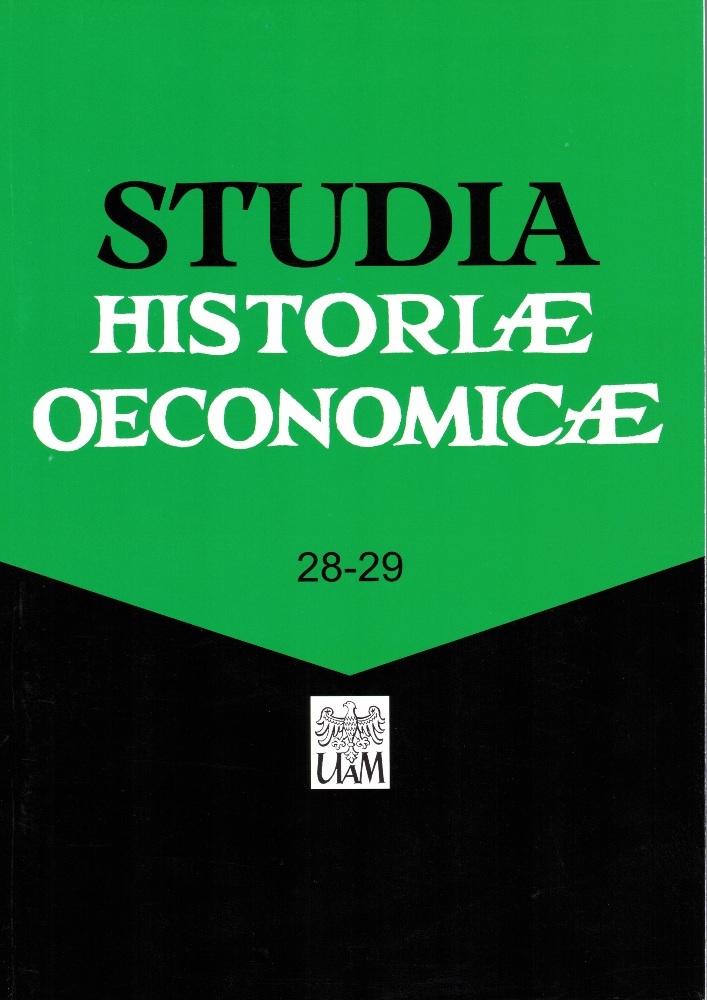Abstract
In the conception of ownership formulated by Polish agrarianists the creation of a new socio-economic system, pluralistic with regard to the forms of ownership, based on small private ownership in agriculture, crafts and retail trade as well as co-operative, self-government and state ownership in the remaining branches of the economy was assumed. Opting for maintenance and popularisation of individual ownership (agrarianists did not treat it) however, as the absolute (sacred) right, but as an institution subjected to social control. They did not condemn differences in material status, though at the same time, they definitely rejected both far-fetched disproportions in ownership (characteristic of capitalism) as well as equality in the field postulated by communists. Apart from the socio-economic functions, the agrarianists assigned an important political role to ownership. In their opinion, it constituted the protection of a citizen's property, the guarantee of their freedom and the way to a truly democratic political system. Relatedly, they put great emphasis on the popularisation and protection of individual, co-operative and self-governed ownership and referred to state ownership, characteristic of totalitarianism, with great caution.
References
AZHRL – Archiwum Zakładu Historii Ruchu Ludowego
- Centralne Kierownictwo Ruchu Ludowego Roch, 13.
Borkowski, J. and Kowal, J. (eds) (1966) Materiały źródłowe do historii polskiego ruchu ludowego. Vol. III: 1931–1939. Warszawa: Ludowa Spółdzielnia Wydawnicza.
Gołębiowski, E. and Jarecka-Kimlowska, S. (eds) (1978) Związek Młodzieży Wiejskiej RP „Wici”. W walce o postęp i sprawiedliwość społeczną. Wybór dokumentów 1928–1948. Warszawa: Ludowa Spółdzielnia Wydawnicza.
Lato, S. and Stankiewicz, W. (eds) (1969) Programy stronnictw ludowych. Zbiór dokumentów. Warszawa: PWN.
Nowak, J. and Mańkowski, Z. (eds) (1966) Materiały źródłowe do historii polskiego ruchu ludowego. Vol. IV: 1939–1945. Warszawa: Ludowa Spółdzielnia Wydawnicza.
Bełch, J. (1939) Katolickie odrodzenie wsi. Poznań: Wydawnictwo Katolickiego Związku Młodzieży Męskiej.
Borkowski, J. (1966) Wizje społeczne i zmagania wiciarzy w świetle młodzieżowej prasy ludowej 1928–1939 („Wici”, Znicz, Społem, Młoda Myśl Ludowa, Chłopskie Życie Gospodarcze). Warszawa: Ludowa Spółdzielnia Wydawnicza.
Borkowski, J. (1976) ‘Miłkowski Stanisław’, in Polski Słownik Biograficzny, 21. Wrocław–Warszawa–Kraków–Gdańsk: Zakład Narodowy im. Ossolińskich. Wydawnictwo, pp. 260–262.
Bujak, F. (1919) O naprawie ustroju rolnego w Polsce. Kraków: Gebethner i Wolff.
Chrobak, T. (1998) Filozoficzne przesłania agraryzmu. Studium wybranych zagadnień. Rzeszów: Wydawnictwo Wyższej Szkoły Pedagogicznej.
Cywiński, B. (1983) ...potęgą jest – i basta. Z minionych doświadczeń ruchów społecznych na wsi. Paris: Editions Spotkania.
Dąbrowski, S. (1981) Koncepcje przebudowy Polski w programach i publicystyce ruchu ludowego 1939–1945. Warszawa: Ludowa Spółdzielnia Wydawnicza.
Golec, A. (1994) Agrarystyczne koncepcje gospodarcze. Lublin: Wydawnictwo Uniwersytetu Marii Curie-Skłodowskiej.
Golec, A. (1996) ‘Poglądy ludowców na własność środków produkcji’, in Jachymek, J., Sowa, K.Z. and Śliwa, M. (eds) Myśl polityczna ruchu ludowego. Series Chłopi. Naród. Kultura, 1, pp. 329–338.
Grabski, W. (1927) Znaczenie czynników psychicznych w produkcji rolnej. Warszawa: nakładem autora.
Grabski, W. (1930) Wieś i folwark. Drobne i duże gospodarstwa rolne ze stanowiska ekonomicznego. Warszawa: Kasa im. Mianowskiego.
Jachymek, J. (1993) Neoagraryzm i trzecia droga. Przebudowa i walka o nową Polskę. Lublin: Wydawnictwo Czas.
Kuncewicz J. (1934) Na nowych drogach. Próba programu z uwzględnieniem potrzeby koniecznej przebudowy życia społecznego i państwowego. Cieszyn: Wydawnictwo Piast.
Lech, A. (1991) Agraryzm wiciowy. Łódź: Wydawnictwo Uniwersytetu Łódzkiego.
Listowski, A. (1938) ‘Uwagi ogólne o zagadnieniach ustroju’, in Lutosławski, J. (ed.) Księga Pamiątkowa na 75-lecie Gazety Rolniczej 1861–1935. Księga wsi polskiej: źródła, dzieje i kierunek jej kultury. Vol. II. Warszawa–Lwów: Wydawnictwo Zakładu Narodowego im. Ossolińskich we Lwowie, pp. 927–941.
Lutyk, L. (1935) ‘Ustrój państwowo-społeczny w ramach ideologii agraryzmu’, Młoda Myśl Ludowa, 7, pp. 8–14.
Łuczak A. (1982) Społeczeństwo i państwo w myśli politycznej ruchu ludowego II Rzeczypospolitej. Warszawa: Ludowa Spółdzielnia Wydawnicza.
Michałowski, S. (1996) ‘Lud a niepodległość Polski w myśli politycznej okresu zaborów’, in Jachymek, J., Sowa, K.Z. and Śliwa, M. (eds) Myśl polityczna ruchu ludowego. Series Chłopi. Naród. Kultura, 1. Rzeszów: Wydawnictwo Wyższej Szkoły Pedagogicznej, pp. 127–145.
Miłkowski, S. (1934a) Agraryzm jako forma przebudowy ustroju społecznego. Kraków: Związek Młodzieży Wiejskiej Spółdzielni Oświatowej w Krakowie.
Miłkowski, S. (1934b) ‘Na szlakach walki o samodzielną myśl chłopską’, Młoda Myśl Ludowa, 13, pp. 5–11.
Miłkowski, S. (1936) Pisma publicystyczne 1930–1939, ed. by Piątkowski, W. Warszawa: Ludowa Spółdzielnia Wydawnicza.
Piątkowski, W. (1993) Wokół idei agraryzmu. Warszawa: Naczelny Komitet Wykonawczy Polskiego Stronnictwa Ludowego.
Tokarczyk, R. (2000) Współczesne doktryny polityczne. Kraków: Kantor Wydawniczy Zakamycze.
Wojtas, A. (1983) Problematyka agrarna w polskiej myśli politycznej 1918–1948. Warszawa: Ludowa Spółdzielnia Wydawnicza.
Zakrzewski A. (1978) Wincenty Witos. Chłopski polityk i mąż stanu. Warszawa: Ludowa Spółdzielnia Wydawnicza.
Zakrzewski, A. (1988) Od Stojałowskiego do Witosa. Warszawa: Krajowa Agencja Wydawnicza.
Zaleski, A. (Orkacz) (1933) Agraryzm. Próba izolacji i syntezy ludowej myśli politycznej (tematy do rozważań dyskusyjnych). Warszawa: Związek Młodzieży Wiejskiej RP.
Ziembiński, J. (1960) ‘Z zagadnień genezy i podstawowych założeń ideowo-politycznych agraryzmu w Polsce’, Roczniki Dziejów Ruchu Ludowego, 2, pp. 106–147.
License
Copyright (c) 2011 Tadeusz Janicki

This work is licensed under a Creative Commons Attribution-ShareAlike 4.0 International License.





